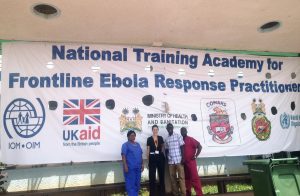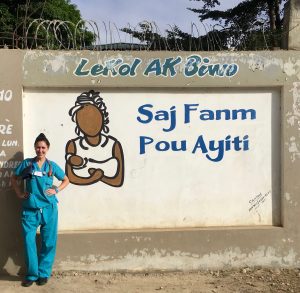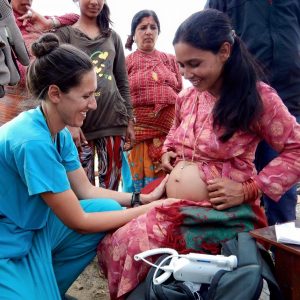Written by: Emily Scott, RN, BSN. Emily blogs about travel and ethical volunteering at http://www.twodustytravelers.com/
As a nurse who has been on a dozen medical missions over the past decade, I get a lot of questions from nurses about where to start. I know from experience that turning your dream of humanitarian nursing into reality can seem like an overwhelming task! So here is my advice for nurses who are dipping their toes into the sea of global health:
1. Start by asking yourself some questions.
What exactly are you hoping to do abroad? Almost every nurse I talk to about humanitarian nursing tells me they’d love to go on a “medical mission” – but that can mean vastly different things to different people. From one-week trips to making a lifelong career hopping from country to country, the options are endless.
So the first step is identifying what’s right for you. If you’re interested in short-term volunteer medical missions, you’ll go about things very differently than if you’re hoping to get hired on with Doctors Without Borders for a year-long paid placement.
Knowing how long you want to volunteer is the first step to whittling down which organization is right for you. A few more questions can narrow it down even further: What’s your nursing specialty? If you work in the operating room, seek out surgical missions; if you work in labor and delivery (like me!), there are plenty of women’s health organizations out there. What’s your budget? The hard truth is, unless you’re able to commit at least six months to an overseas position, you will almost certainly have to fund your trip yourself. Volunteer fees run anywhere from a few hundred to a few thousand dollars, and you’ll have to cover airfare, too. Where do you want to go? Maybe you speak a foreign language or feel a connection to a particular place (East Africa will always have my heart). If you’re open to going wherever you can be most useful, that’s great too!
Once you know the answers to these questions, the next step is:
2. Do your research.
Picking one program out of the sea of global health nonprofits can be a daunting task. A good old-fashioned Google search for organizations working in your specialty will get you started, but you’ll have to go down the rabbit hole a ways before finding the one that’s right for you.
The nonprofit One Nurse At A Time maintains a searchable directory of organizations seeking volunteer nurses here. It’s not an exhaustive list, but it’s a good way to get some ideas. Dig into the websites for groups that look interesting to you. They should have pages dedicated to volunteer requirements and detailed descriptions of their programs.
Once you’ve narrowed it down to several organizations:
3. Reach Out.
Email the nonprofits you’d like to work with. Introduce yourself and ask them any questions you have about their program. It’s also a great idea to ask them to connect you with a nurse who has volunteered with them before. That person will be able to tell you exactly what to expect and how to prepare. And ask these nurses to be frank with you – not all volunteer trips are created equal, and you want to know if previous volunteers really felt like they made a difference before you devote your time and money to this.
Your fellow nurses who work in global health are an invaluable resource to you. Reach out to groups like Global Nursing Caucus and One Nurse At A Time. Talk to the nurse on your unit who volunteers abroad (there’s always one!). Just like getting any other job, personal connections are everything.
There are hundreds, if not thousands, of medical nonprofits working in every corner of the world, and every nurse who has served abroad has a filing cabinet in her head full of contacts and information. Whether you’re particularly interested in working on obstetric fistulas in Sierra Leone or diabetes prevention in Mexico, ask around! Someone will know someone who’s working on whatever it is that lights you up, and they’ll probably be happy to introduce you.
4. Make sure you’re working ethically.
The global health community is waking up to the unintended negative consequences of many volunteer programs. It is common to find short-term fixes that don’t do anything to solve underlying health problems, make a community dependent on foreign intervention, and sometimes even rob local healthcare providers of desperately needed jobs.
For example, the first medical mission I ever participated in provided free care for three days in a slum in Nairobi, Kenya. Scores of people were treated by visiting foreign clinicians, but what happened when we left? Who followed up on these patients in our absence? Was the community really any better off in the long run?
The most sustainable way to move forward, in my opinion, is to focus on training and mentoring local providers rather than treating patients ourselves. The goal should be to work ourselves out of a job, not create a dependence that has us returning every few months in perpetuity.
It’s essential to examine these issues before you volunteer abroad, no matter how uncomfortable the answers might make you. Good intentions simply are not enough to prevent you from making a mess in a needy community. So make sure to ask any organization you’re thinking of working with how they empower the local community and ensure that their programs are sustainable after foreign volunteers go home.
Once you’ve examined the nonprofit you’re working with, turn that critical eye on yourself. Working in developing countries often means you can get away with doing things you wouldn’t do at home (like performing procedures outside your scope of practice, or posting pictures of patients) – but should you? It’s unethical to treat our patients in developing countries differently from our patients at home. My golden rule is: If you wouldn’t do it at home, you shouldn’t do it abroad. (That goes for medical procedures, protecting patients’ privacy, evangelizing – you name it.)
Ok, now that I’ve scared you off a little:
5. Just go for it. The first medical mission is always scary. (Honestly, I still get butterflies every time I pack for one and I’ve been doing this for a decade.) Part of the reality of this work is that you will be uncomfortable. You will be challenged physically and emotionally, and at times you will be upset and exhausted and disappointed. But if this work is right for you, you’ll also be energized and inspired and excited to do better tomorrow. The only way to know is to try.
Do your research, prepare as much as you can, and absolutely make sure you’re putting the host community first – then take the leap!


